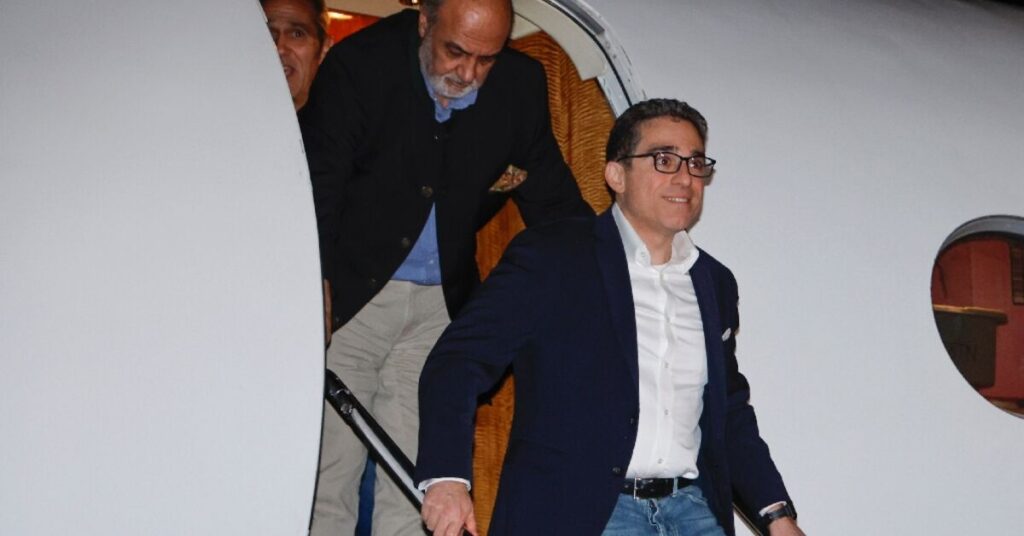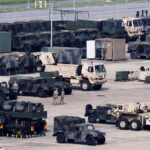Five Americans released by Iran in a high-stakes prisoner swap landed back in the United States on Tuesday for a joyful reunion with family members.
The five arrived aboard a business jet at a military airport at Fort Belvoir, southwest of Washington.
Family members waved American flags and hugged the released prisoners as they stepped off the plane. They then posed for a group photo, grinning broadly.
“Welcome home,” National Security Advisor Jake Sullivan posted on X, formerly Twitter.
The former prisoners, including one who was held for eight years, were part of a rare prisoner swap between Washington and Tehran, a deal that included the release of $6 billion in frozen funds by US ally South Korea.
The swap marked a slight thaw in relations between the two countries on a range of issues, including Iran’s progress in its nuclear program, although some observers urged caution in viewing the release as a sign of change.
The prisoners arrived on a flight from the Gulf state of Qatar, which helped facilitate the exchange, which took months to negotiate. They will undergo a medical check-up in the Washington area.
Iran, which does not recognize dual nationality, continues to detain a number of European nationals, including Jamshid Sharmahd, a German citizen sentenced to death.
At the United Nations, EU foreign policy chief Josep Borrell met with Iranian Foreign Minister Hossein Amir-Abdollahian on Tuesday and expressed the bloc’s “strong condemnation” of the ongoing detentions, an EU report said -declaration.
President Joe Biden’s administration says there are no known American citizens left in Iranian prisons.
The country has rejected criticism at home that it would pay a “ransom”, stressing that the money will only be used for humanitarian purposes, threatening to freeze the money again if it is not.
She emphasizes that she is not easing the sanctions.
– Iran demands end to sanctions –
Iran has maintained it has full access to the funds.
In his address to the United Nations General Assembly, Iranian President Ebrahim Raisi said the reimposed sanctions by the United States were a “political instrument against people” that had failed.
“These sanctions have not achieved the desired results. Now is the time for the United States to take the wrong path and choose the right side,” Raisi said.
But in his own speech at the United Nations, Biden pledged to work with allies to “address Iran’s destabilizing activities that threaten regional and global security.”
The United States remains “steadfast in our commitment that Iran should never acquire a nuclear weapon,” Biden said.
Unlike European powers, the United States does not maintain diplomatic relations with the clerical state of Iran, which was established after the overthrow of the pro-Western Shah in 1979.
Secretary of State Antony Blinken said the prisoner issue is separate from moribund talks about reviving a 2015 nuclear deal that was trashed by former President Donald Trump.
One of the released prisoners praised Biden for ignoring the domestic political backlash and making the “incredibly difficult decisions” that freed them.
“Thank you, President Biden, for ultimately putting the lives of American citizens above politics,” Siamak Namazi, a businessman detained in Iran since 2015, said in a statement.
Other released prisoners include conservationist Morad Tahbaz and venture capitalist Emad Sharqi, both of whom were held in the infamous Evin prison but were placed under house arrest last month.
Two other American prisoners involved in the swap have not been publicly identified.
The five Iranian prisoners released by the United States have been convicted or charged with nonviolent crimes, one of which will soon be released, officials said.
France, which supports the nuclear deal and believes four of its nationals are being arbitrarily detained by Iran, warned against making connections.
“I think we have to be extremely careful to distinguish this from the nuclear issue,” French Foreign Minister Catherine Colonna told reporters.


